The inversion (/\)
of number 7, a periodic number and fatty acids:
It is a fundamental assumption in this
model that physics and chemistry has a mathematical underground
- a geometrical and arithmetic one.
We can presume too that dimension degrees
not only represent and form the geometries but also generate
numbers.
The cell-membrane could be seen as one
of the most essential conditions for life,
an individualising border. And its most elementary structure
as a border is made up of fatty acids and glycogen.
Atoms as units has a parallel in cells
as units on the biological level, and cell-membranes could
perhaps be interpreted as an expression for the nuclear
force in life chemistry.
What about 1/7 ?
7/\ = 0, 14-28-57-14-28-57...
etc.
- The synthesis of fatty acids is a periodic
one as the periodic number of 1/7.
- The elementary molecules of the acids
are CH2: 14 A, CH2-CH2: 28 A...
- According to the views of the String Theory
we should have 11 dimensions, with 7 of these dimensions
inwards curved - to compare with the function of a cell-
membrane ?
- Compare number 7 as 4 + 3 in the superposed
chain of a dimension chain, see general aspects on fatty
acids, link to the left.
- 7/3 also a kind of relation between superposed figures
of first and second half of the chain, 21/9 = 7/3, inverted
3/7:

- 22 / 7 ~ p (Cf. 22: d-degree 2: 2a------1------2b,
the form structure of lipids.)
A fatty acid and the process of synthesis and mass numbers
(A)
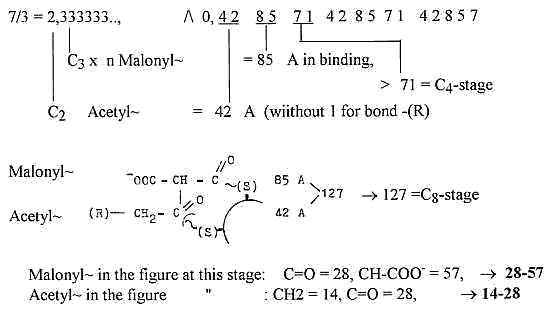
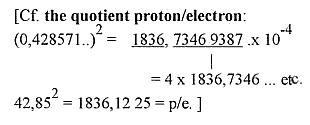
Mass numbers of two of the most common
fatty acids in animals:
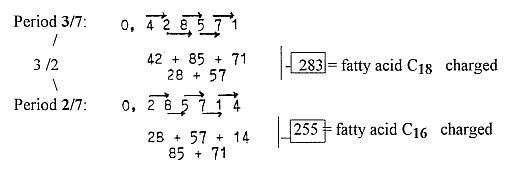
Observe: The CH2-CH2-groups (28 A) can also
- alternatively from Acetyl~, be derived from the amino
acid Ileu: side chain 57 A.
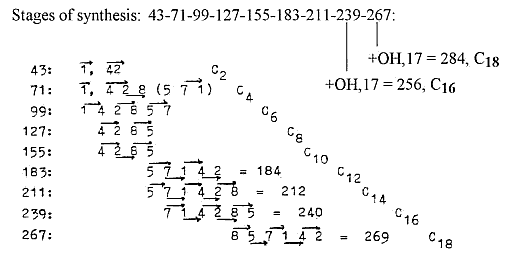
Triplet numbers:

And what should it imply, reading the periodic
number backwards (!)
- and parts of it too ? Mirror resonance in the underlying
dimensional patterns of vibrations in the complex rooms
of the 7 hidden dimensions of the String theory??
We can note that mirroring the 2-figure-readings
in the period 3/7 gives a relation between the
two fatty acids C16 and C18, uncharged and charged respectively:

Coenzymes, some of them, in the synthesis and breakdown
of fatty acids:
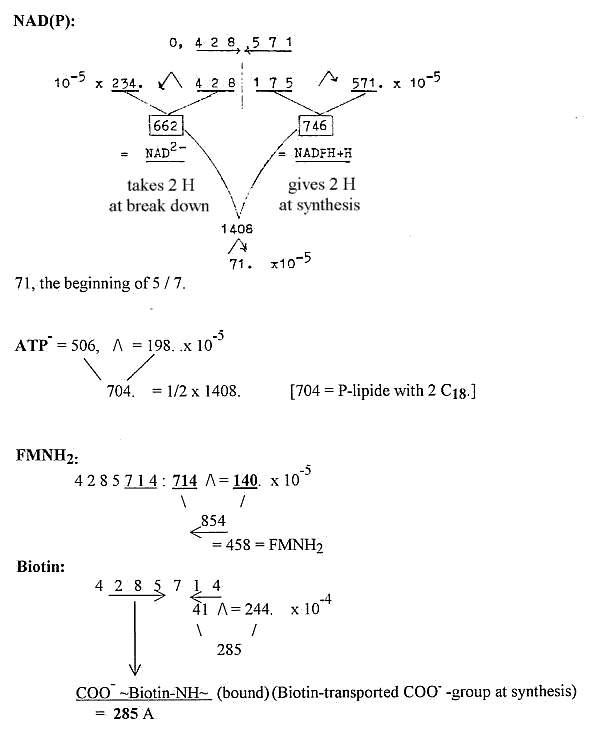
---------------------------------------------------------------------------------------------------
One lipid:
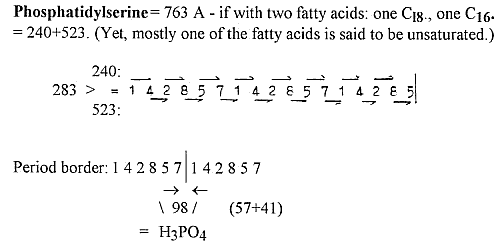
1/7 and Collagen:

The collagen fibres are made up of series
of the amino acids Gly - Pro - Pro:
(Sometimes Lys or Leu instead of a Pro.)
Why just these amino acids, in this
order? Is there any chemical explanation?
Their side chains (here called R-chains)
has the mass-(A-)-numbers
1 - 42 - 42, sum 85:
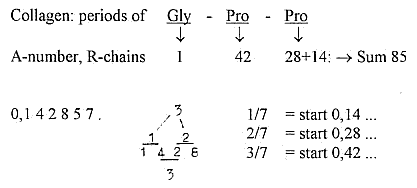
The "B-chains" of the amino acids,
the similar parts which combine through condensation in
the peptide bonds, has the mass number 74-18 = 56 = 14+42.
Strangely enough we also find such figures as from 1/7
in measures of length and breadth of collagen in the entity
Å (10-10 m):
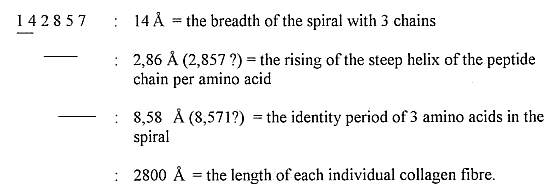
The fibres line up alongside each other
with 1/4 of a period length of displacement between them.
(Numbers in the figure below from the source):
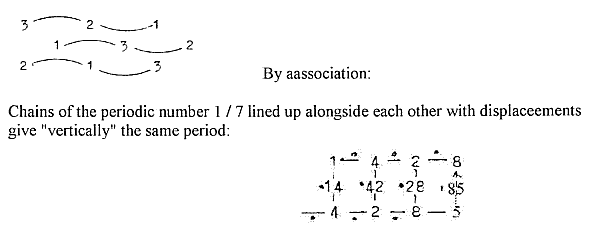
In muscle fibres of parallelly arranged
Myosin and Actin filaments there are formed cross-links
between actin and myosin when the muscles contract - as
if actin was "climbing" stepwise on the myosin
filament.
Could there eventually be a related
mathematical pattern of periodic numbers underlying this
biochemically expressed action?

After synthesis of the collagen chains, some side chains
of Prolin get oxygen as additions: hydroxi-Pro.
Mass number 42 + 16 = 58 A.
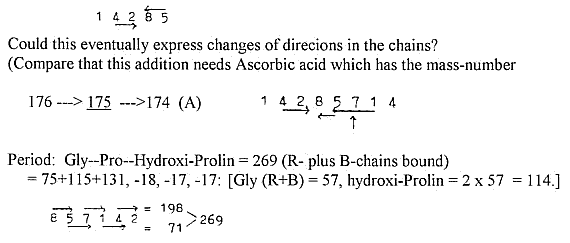
Elastin, another fibrous protein, is said to contain
much of the amino acids
Gly, Pro and Leu: The side chain of Leu has the
mass number = 57 A
Suppose we just add Leu to the series of collagen; we
get:

Other molecules appearing added to collagen:
Ca10(OH)2(PO4)6 -
crystals attached to collagen in bone tissue:
Mass-number = 1004 A = 4 x 251 = 4/3 x a
collagen period if with 3 chains
- Gly - Pro - Pro- = 251 A,

Triplet numbers of a dimension chain: 3
x 251 = 753 = 543 + 210.
1004 = = 2/3 x 1506: 543 + 432 + 321 + 210. Cf. sum of
24 amino acids.
In connective tissue, cartilage and bone
appears
Hyaluronic acid, a disaccharide x
n with a COO--group at one of the hexoses,
NH-CO-CH3, instead of OH at the other.
(It is found among other places in
the synovial fluid.)
Chondroitin sulphate, a disaccharide
x n, with a COO--group at one the hexoses,
and a SO3--group + NH-CO-CH3-group at the other.
(Much in cartilage.)

Chondrotin sulphate: (if with uncharged SO3- group) =
175 + 283 = 458:
283 = 42+28+85+57+71
Histamine and Serotonin, in
connective tissue:
- Histamine from the amino acid His, 155 A, -COO
= 111 A:
4 2 8 5...: 42 + 28 + 85 = 155 = His (Histamine
= 111 = factor in the period 1/7)
- Serotonin from the amino acid Trp, 204 A, + 16, -44
= 176 A, 175 charged.

In muscle fibres:
Carnosine and Anserine,
two peptides made up of β-alanine and the amino acid
His:
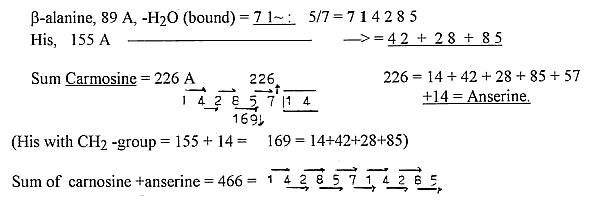
*

















